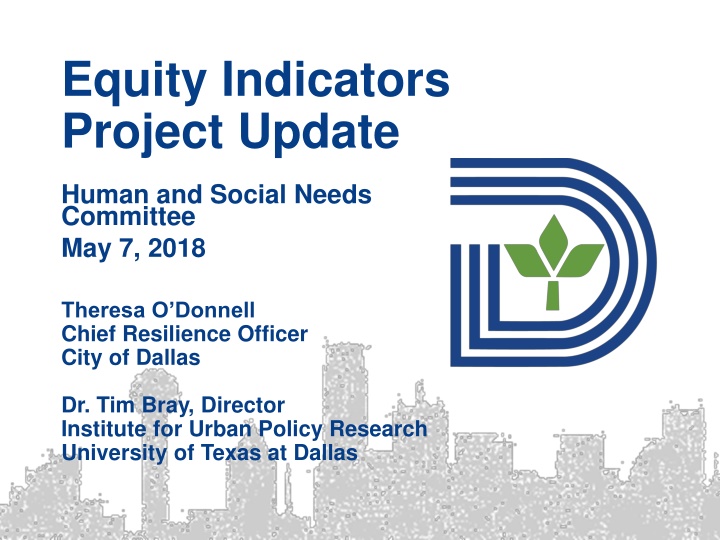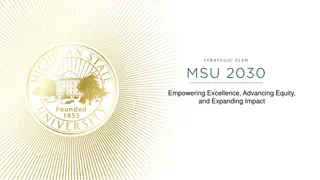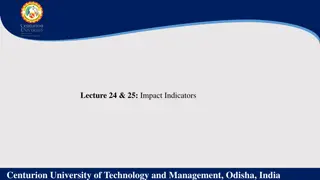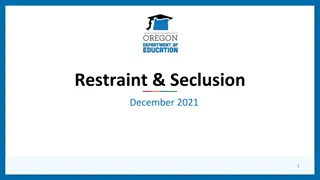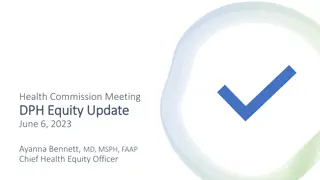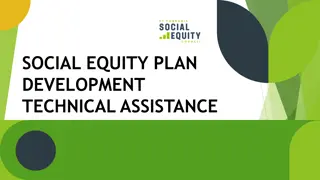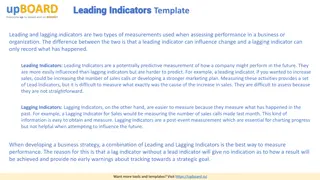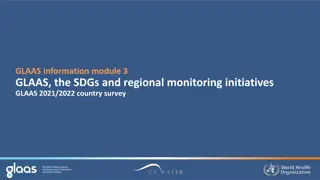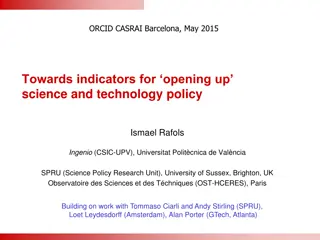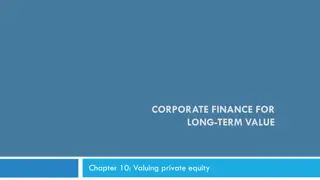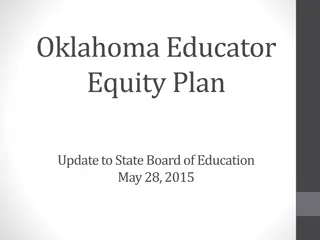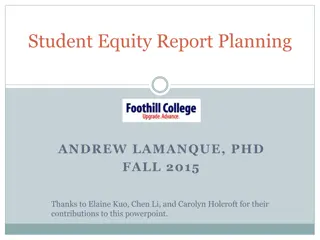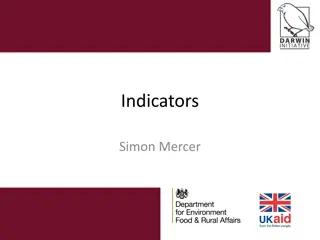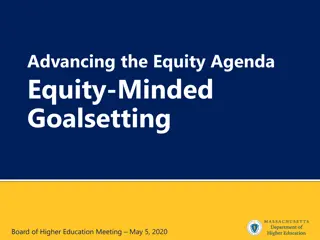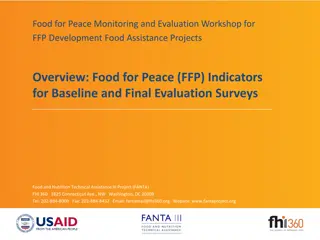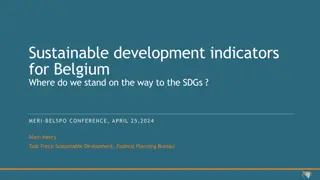Equity Indicators Project: Update and Initiatives
The Equity Indicators project aims to advance equity in City government by incorporating an Equity Lens into visioning processes, measuring inequity, and fostering communication among diverse communities. The initiatives focus on building an equitable City administration and workplace culture, promoting collaboration across sectors, and driving action to address inequities in Dallas.
Download Presentation

Please find below an Image/Link to download the presentation.
The content on the website is provided AS IS for your information and personal use only. It may not be sold, licensed, or shared on other websites without obtaining consent from the author.If you encounter any issues during the download, it is possible that the publisher has removed the file from their server.
You are allowed to download the files provided on this website for personal or commercial use, subject to the condition that they are used lawfully. All files are the property of their respective owners.
The content on the website is provided AS IS for your information and personal use only. It may not be sold, licensed, or shared on other websites without obtaining consent from the author.
E N D
Presentation Transcript
Equity Indicators Project Update Human and Social Needs Committee May 7, 2018 Theresa O Donnell Chief Resilience Officer City of Dallas Dr. Tim Bray, Director Institute for Urban Policy Research University of Texas at Dallas
Overview Provide an overview of the Equity Indicators project Present the equity indicators and preliminary findings Next steps 2 Human and Social Needs
Background On October 16, 2017, the Human and Social Needs Committee received an update on the Resilient Dallas Phase II scope of work that included an introduction to the Equity Indicators project. On December 4, 2017, the Equity Indicators project team sought direction from the Human and Social Needs Committee on proposed domains and indicators. 3 Human and Social Needs
Equality vs. Equity www.rwjf.org 4 Human and Social Needs
Incorporating Equity Indicators into the Resilient Dallas Strategy A Resilient Dallas is an equitable Dallas Goal 1: Advance equity in City government. Dallas is welcoming when we embrace our diversity Goal 2: Ensure Dallas is a Welcoming City to immigrants and all residents. Dallas works when our people work Goal 3: Expand economic opportunity for Dallas vulnerable and marginalized residents. Dallas moves when our people can move Goal 4: Ensure Dallas provides residents with reasonable, reliable, and equitable transportation access. Dallas is healthy when our people are healthy Goal 5: Leverage partnerships to promote healthy communities. Goal 6: Invest in neighborhood infrastructure to revitalize historically underserved neighborhoods. Goal 7: Promote environmental sustainability to improve public health and alleviate adverse environmental conditions. Dallas thrives when our neighborhoods thrive 5 Human and Social Needs
Equity Initiatives A Resilient Dallas is an equitable Dallas Goal 1: Advance equity in City government. Initiatives 1.1 1.2 Build an equitable City administration and workplace culture. Support and partner with anchor institutions and community-based efforts to advance equity initiatives across Dallas by recognizing and reconciling a history of inequity and fostering communication of social differences between diverse communities and individuals. 1.3 Incorporate an Equity Lens into the citywide visioning process for Goals for Dallas 2030, creation of the City s Strategic Plan, and development of the biennial budget. 1.4 Commit to identifying and measuring inequity to drive collaborative action across sectors. 6 Human and Social Needs
Equity Actions Initiative 1.1 Build an equitable City administration and workplace culture. Launch Timeframe Action Lead Partners 1.1.1 Conduct an internal audit of City policies to develop a common understanding of equity within the organization as an employer and as a service provider to our residents. Equity consultant City Manager s Office Fall 2018 1.1.2 Examine administrative policies and programs through a shared learning process that includes trainings, data collection, and monitoring. City of Dallas departments City Manager s Office Spring 2019 7 Human and Social Needs
Equity Actions Initiative 1.2 Support and partner with anchor institutions and community-based efforts to advance equity initiatives across Dallas by recognizing and reconciling a history of inequity and fostering communication of social differences between diverse communities and individuals. Launch Timeframe Action Lead Partners 1.2.1 Engage in external community conversation with Dallas Truth, Racial Healing and Transformation through intentional listening, examination of institutional racism in policies, and commitment to timely change. Dallas Truth, Racial Healing and Transformation City of Dallas Fall 2018 1.2.2 Support the efforts of Dallas ISD s Racial Equity Office by acknowledging race and place matter in educational achievement and collaborating on strategies and actions to drive timely change in neighborhoods where disparate conditions impact a child s ability to learn. Summer 2017 (City collaboration to begin Summer 2018) Dallas ISD Racial Equity Office City of Dallas 8 Human and Social Needs
Equity Actions Initiative 1.3 Incorporate an Equity Lens into the citywide visioning process for Goals for Dallas 2030, creation of the City s Strategic Plan, and development of the biennial budget. Launch Timeframe Action Lead Partners City of Dallas departments, philanthropic organizations 1.3.1 Review City policies and programs to assess opportunities for progress in achieving equity in service delivery. City Manager s Office Fall 2018 1.3.2 Integrate Equity Indicators into Dallas 365 to demonstrate effectiveness in achieving equity in service delivery over time. Office of Resilience, Office of Budget City of Dallas departments Summer 2018 9 Human and Social Needs
Equity Actions Initiative 1.4 Commit to identifying and measuring inequity to drive collaborative action across sectors. Launch Timeframe Action Lead Partners 1.4.1 Work with the City University of New York s (CUNY) Institute for State and Local Governance and the University of Texas at Dallas (UTD) Institute for Urban Policy Research to design and publish Equity Indicators that measure and assess progress toward achieving greater equity in Dallas over time. CUNY Institute for State and Local Governance, UTD Institute for Urban Policy Research Office of Resilience Spring 2018 1.4.2 Work with the Community Council of Greater Dallas, universities, philanthropic foundations, nonprofits, and service providers to develop and maintain an open- access platform for curated, community-wide data to foster collaboration, align resources, drive actions, and measure outcomes in pursuit of shared community goals. Department of Communication and Information Services, Community Council of Greater Dallas University and nonprofit data curators Fall 2018 10 Human and Social Needs
Dallas Equity Indicators Developed by the City University of New York Institute for State and Local Governance (ISLG) Funding has been provided by the Rockefeller Foundation for ISLG to work with five cities Dallas, Tulsa, St. Louis, Oakland and Pittsburgh University of Texas at Dallas Institute for Urban Policy Research (IUPR) has been our data partner on this project 11 Human and Social Needs
Dallas Equity Indicators Goal: To design a framework of indicators to measure progress toward achieving greater equity in Dallas over time Policy tool that can be used by communities, government agencies, researchers, and policy groups Use same methodology as NYC, but working to create a tailored tool for Dallas Focus: People who experience inequities The areas in which they experience inequity The current state of equity in these areas How the state of equity changes over time 12 Human and Social Needs
Process of Developing Tool 1. Identify goals/objectives and priority areas Based on City Council priorities, Resilience Strategy, other planning efforts underway, prior community engagement, etc. 2. Identify relevant inequities and groups Experienced locally 3. Develop initial draft of framework Themes, topics, and sample indicators Disadvantaged groups 4. Test indicators To determine availability of data and whether indicators make sense in light of data 13 Human and Social Needs
Process of Developing Tool (cont.) 5. Finalize first year tool and release 2018 static scores 6. Potentially revise indicators based on feedback 7. Conduct second round of data collection 8. Release 2019 static scores and 2018-2019 change scores 14 Human and Social Needs
Scores Over Time City score Theme score Topic score Indicator score Four Levels From 1 to 100 (highest inequity to highest equity) Aggregate lower level scores to produce higher level scores Static Scores Increase (+), decrease (-), no change (0) Change score = Current year s score - baseline Change Scores 15 Human and Social Needs
Equity Indicators Listening Sessions UTD convened seven listening sessions and attended two town hall meetings to gather input and hear from Dallas residents, advocates, and service providers about their perceptions of Dallas current state of equity in the topical areas identified by researchers: Justice Economic Opportunity Housing Public Health Education Transportation Arts and Culture 16 Human and Social Needs
Resulting Equity Indicators The six themes remained the same: Economic Opportunity Education Housing and Neighborhood Quality Justice and Government Public Health Transportation and Infrastructure 24 topics minor variations 72 indicators total 17 Human and Social Needs
Equity Themes and Topics 18 Human and Social Needs
Equity Themes and Topics 19 Human and Social Needs
Preliminary Scores UTD has provided preliminary indicator and theme scores for four of the six themes. Education and Transportation theme scores are not finalized and are not included here. Please note, all scores are preliminary and subject to change prior to publication of the final report. 20 Human and Social Needs
Economic Opportunity Theme Score: 28/100 The sample indicator Job Opportunities is one of the three least equitable indicators with a score of 1 Racially diverse neighborhoods have access to 17 times the number of jobs (40,000+) within a 30-minute public transit commute as majority-Black neighborhoods (~2,500) Topic Score Business Development 29 Employment 29 Income 37 Poverty 19 21 Human and Social Needs
Housing and Neighborhood Quality Theme Score: 49/100 The sample indicator Internet Coverage earned a score of 16 Fewer than 10% of White households lack internet access, compared to more than 30% of African American households Topic Score Affordability of Housing Community Resources Quality of Housing 49 63 25 Services 61 22 Human and Social Needs
Justice and Government Theme Score: 46/100 Whites are five times more likely than Hispanics to serve on a board or commission (Representation in Government) Traffic stops involving African Americans are 1.5 times more likely to result in a vehicle search than those involving Whites (Traffic Stops) Topic Score Government 57 Incarceration 43 Law 42 Enforcement Victimization 40 23 Human and Social Needs
Public Health Theme Score: 38/100 The rate of asthma for Black children is almost eight times the rate for Asians and just more than four times the rate for Whites and Hispanics (Child Asthma) The pregnancy rate for Hispanic mothers under the age of 16 is nearly five times higher than the rate for White mothers (Teen Pregnancy) Topic Score Behavioral Risk Factors 36 Health Care 50 Population Health Maternal and Child Health 35 32 24 Human and Social Needs
Next Steps Complete indicator scoring and release first report Collaborate in an extensive community engagement effort with Truth, Racial Healing and Transformation, as well as other local community groups Re-evaluate indicators after receiving feedback and input from the community Second round of data collection will begin Summer 2018 Second report with an analysis of change (or no change) by the first quarter of 2019 25 Human and Social Needs
Equity Indicators Project Update Human and Social Needs Committee May 7, 2018 Theresa O Donnell Chief Resilience Officer City of Dallas Dr. Tim Bray, Director Institute for Urban Policy Research University of Texas at Dallas
Appendix 27 Human and Social Needs
Listening Session: Justice Participant Concerns: Policing practices Presence of law enforcement in neighborhoods Response times Warnings/tickets issued vs. arrests Tenant vs. landlord legal disputes Criminalization of homelessness 28 Human and Social Needs
Listening Session: Economic Opportunity Participant Concerns: Develop a racial equity toolkit for economic development initiatives Establish local hiring policies for marginalized persons and groups Barriers to employment for people of color that remain regardless of available training programs Jobs and training programs that are inaccessible due to location or language barriers Child poverty/child homelessness 29 Human and Social Needs
Listening Session: Housing Participant Concerns: City commitment to affordable housing opportunities Incompatible land uses within close proximity to neighborhoods of color Inadequate infrastructure in low-income neighborhoods: sidewalks, lighting, internet 30 Human and Social Needs
Listening Session: Public Health Participant Concerns: Barriers to health insurance and the rate of uninsured/under-insured people Food deserts Reproductive health/maternal health Environmental health effects of industrial/heavy commercial land uses within close proximity to low-income neighborhoods 31 Human and Social Needs
Listening Session: Education Participant Concerns: The impacts of gentrification on student displacement and academic achievement Educational opportunities that address the gap of college readiness Disciplinary measures that disproportionately impact students of color 32 Human and Social Needs
Listening Session: Transportation Participant Concerns: Accessibility of public transportation Holistic approach to housing, transportation, economic development, and public health Safety of public transportation and pedestrianism is impacted by driving culture, inadequate sidewalks, and facilities Transportation should be viewed as a tool for public access Priority should be given to transportation infrastructure 33 Human and Social Needs
